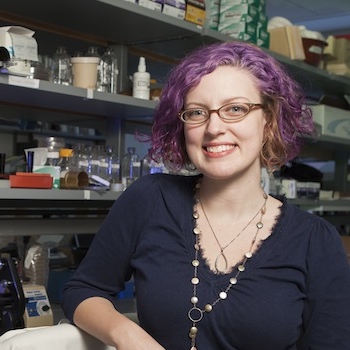New Faculty Profiles showcase GSA members who are establishing their first independent labs. If you’d like to be considered for a profile, please complete this form on the GSA website.
Meleah Hickman
Assistant Professor, Department of Biology (since 2014)
Emory University
Lab website
@meleahhickman
Research program:
My lab investigates how eukaryotic pathogens generate genetic and phenotypic variation as a response to environmental stresses, including antifungal drugs, which has meaningful clinical and evolutionary implications. Specifically, we investigate the genome plasticity of the yeast Candida albicans, a commensal that primarily resides in human gastrointestinal tracts and causes superficial infection in healthy individuals and serious infection in immunocompromised individuals. C. albicans was considered to be an ‘obligate’ diploid organism for nearly a century until recently, when a viable haploid stage was discovered (Hickman et al. 2013). In addition, tetraploid cells occur after mating between diploid partners or through mitotic defects and have been isolated from clinical samples.
Unlike other budding yeasts, C. albicans does not go through meiosis to reduce ploidy, but rather utilizes stochastic and imprecise concerted chromosome loss processes that frequently result in a heterogeneous population as some cells will have chromosomal aneuploidy and/or homozygosis (Hickman et al. 2015). We examine how shifts in ploidy, mediated by sexual cycles in addition to asexual mechanisms promote genetic diversity within a population of cells. These ploidy transitions facilitate large-scale mutations including recombination, aneuploidy, and homozygosis of whole chromosomes within a single cell division and fuel rapid adaptation. We also utilize experimental comparative genetics by using well-established model and non-model yeasts that display a wide-range of sexual, morphological, ecological, and pathogenic lifestyles, yet maintain high levels of genome conservation in order to understand microbial population dynamics as well as the molecular mechanisms by which genome changes arise and their subsequent consequences on fitness.
I am looking for enthusiastic and motivated lab members (graduate students and/or postdocs) to study the molecular mechanisms of chromosome and genome stability of polyploid pathogenic yeast cells. Postdoc candidates are expected to have a PhD in genetics or a related field and should have experience with one or more of the following: yeast genetics, molecular biology, and genomics.
There are a number of opportunities to interact and collaborate with researchers in the Genetics and Molecular Biology Graduate Program; the Population Biology, Ecology, and Evolution Graduate Program; the Emory University Medical School; Georgia Tech; and the CDC. Interested candidates should submit their curriculum vitae, contact information for three references and a cover letter describing past research accomplishments and future research goals to Meleah Hickman. (Contact)
“Determining the best experiment to test your question. The most satisfying experiments are designed so that the outcome, regardless of the result, will be informative and advance our knowledge. A very close second is working with trainees, getting them excited about biology and providing a supportive environment where they can explore and develop their scientific thinking..” – Meleah Hickman on her favorite part of her work
Role of GSA in your career:
The GSA has been tremendously supportive in my career trajectory. In 2014 I received the DeLill Nasser Award for Professional Development in Genetics that I used to attend the Yeast Genetics Meeting where I spoke about some of my postdoctoral research and was able to announce that my newly established independent lab was looking for people. Beyond that financial support, the GSA has been instrumental throughout my graduate and postdoctoral career by having meetings where the broader community can gather and share information. The yeast and fungal communities, in particular, use these opportunities to share the cutting edge of research but also reflect on where the field has come from and how that influences where we are going. As a trainee (both as a graduate student and as a postdoc), this perspective that ‘science is a journey’ has been extremely influential.
Previous training experiences:
- Undergraduate: BA and BS, The Evergreen State College, 2003, Olympia, WA
- Graduate: PhD, Duke University, 2010, Durham, NC
- Postdoctoral: NIH NRSA fellow, University of Minnesota, 2010–2014, Minneapolis, MN
Teaching:
I teach an undergraduate genetics course and am teaching two graduate courses; one on the practice of science (activities that go beyond the bench, such as reviewing manuscripts, writing strategies, individual development plans, etc.) and the other on presenting current topics in genetics, including how to host and interact with members of the scientific community.
Interests outside of work:
Play outside! I grew up in the Pacific Northwest and the mountains there have a siren song that I can never resist. Hiking through the woods and diving underwater are also favorite pastimes. Otherwise, I’m likely to be in my kitchen, baking some sort of treat and/or churning ice cream (of which I frequently share – a perk of being part of my lab group!)













